Views: 0
Probably Not, but until More Research Confirms This, Err on the Side of Caution and Wear Sunscreen While Using Topical Products with Salicylic Acid

The Essential Info
Salicylic acid is a beta hydroxy acid (BHA) that is found in many products for acne-prone skin. If you have looked at the back of acne treatment products at the drugstore, you are probably familiar with seeing salicylic acid listed as the active ingredient, from 0.5% to 2% concentration.
While only partially effective, salicylic acid can help unclog pores. It can also reduce skin oil production and possesses some anti-inflammatory and bacteria-killing properties, all of which can help with acne.
Some people question whether salicylic acid makes the skin more sensitive to the sun because another form of hydroxy acids, called alpha hydroxy acids (AHAs), do in fact increase sun sensitivity. However, the limited evidence we have suggests that salicylic acid does not increase the skin’s sensitivity to the sun.
Still, to be on the safe side, wear sunscreen while you use skincare products or cosmetics containing salicylic acid.

The Science
- The Evidence on Salicylic Acid and Sun Sensitivity
- Why Even Worry about Salicylic Acid and Sun Exposure?
- How Does Salicylic Acid Help with Acne?
- Over-the-counter Products Only Contain Small Amounts of Salicylic Acid
- Side Effects of Salicylic Acid
- The Bottom Line
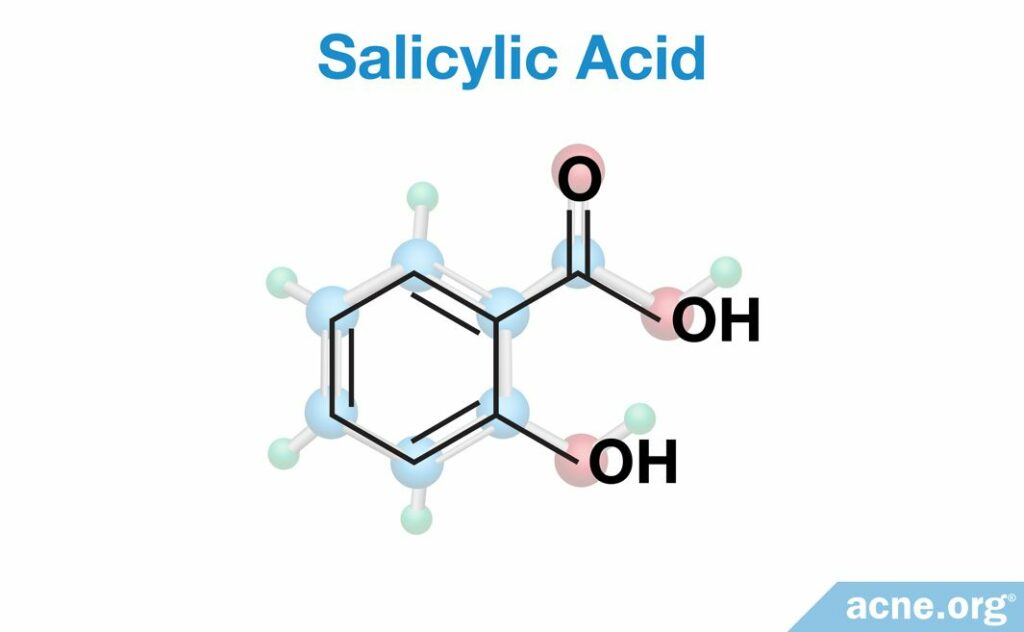
Salicylic acid is an extremely common ingredient in over-the-counter acne products, as well as professional chemical peels. It is an acid that can exfoliate the skin (remove dead skin cells from the skin surface and from inside pores), but it can also reduce skin oil production, decrease inflammation, and act as a mild pain reliever and disinfectant.
Thanks to these properties, salicylic acid decreases the chances of breakouts and provides some relief of acne symptoms such as itch and soreness.1,2 However, if you have ever used over-the-counter salicylic acid products, you may have noticed that it only moderately helps improve acne symptoms, and does not dramatically clear acne.
Salicylic acid belongs to a group of chemicals called hydroxy acids, which are acids used primarily to exfoliate the skin. There are two main types of hydroxy acids:
- Alpha hydroxy acids (AHAs): Common AHAs include glycolic acid, lactic acid, and mandelic acid.
- Beta hydroxy acids (BHAs): Salicylic acid is the only well-known or common BHA. In fact, professionals in the fields of dermatology and cosmetics use the terms “salicylic acid” and “BHA” almost interchangeably.1,2
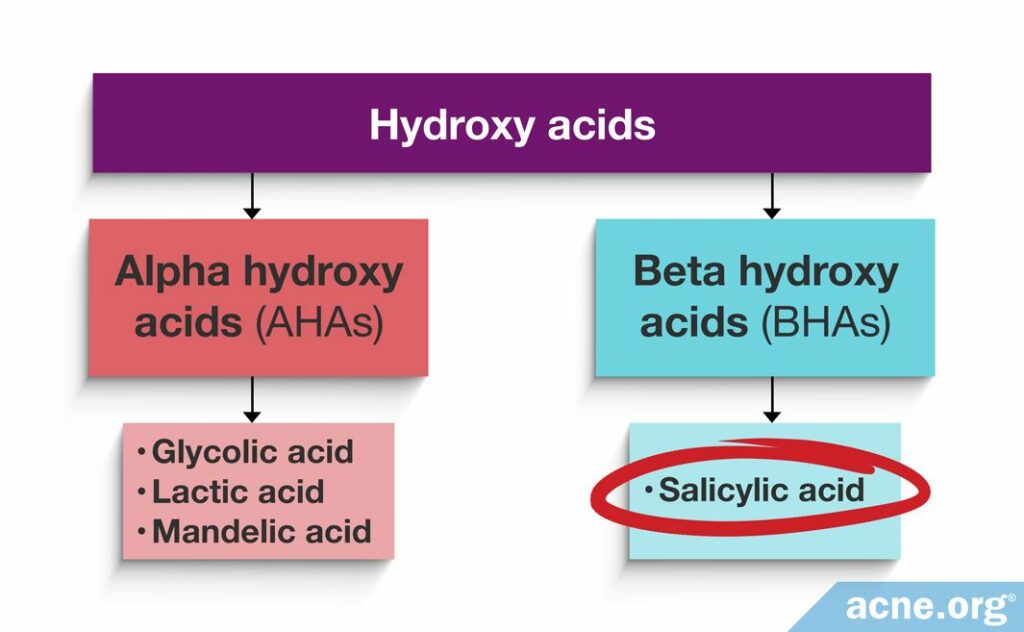
Research has shown that alpha hydroxy acids can make the skin more sensitive to the sun.3 However, the evidence available so far suggests that beta hydroxy acids are probably free from this side effect. In other words, salicylic acid most likely does not make the skin more prone to sun damage. Still, until we have more data to back this up, the safest course is to wear sunscreen whenever you use skin products or makeup containing salicylic acid.
The Evidence on Salicylic Acid and Sun Sensitivity
One study administered treated 14 patients with salicylic acid and then exposed the patients to simulated sunlight. The researchers compared these patients to patients who were exposed to simulated sunlight without receiving salicylic acid.
The scientists found that both groups developed the same amount of sun damage after sun exposure. In other words, salicylic acid did not increase patients’ sensitivity to sunlight. The researchers concluded, “topical application of salicylic acid had no significant effect on the skin’s sensitivity to [sunlight].”4
Expand to read details of study

The study was published in 2009 in the Journal of Dermatological Science. The researchers tested the effects of 2% salicylic acid on 14 patients who were exposed to simulated sunlight. For comparison, a second group of patients received 10% glycolic acid, which is an alpha hydroxy acid, and a third received no topical treatment. The researchers specifically chose chemical concentrations that are common in cosmetic products. After all groups received the same sunlight exposure, the researchers compared the skin redness, number of sunburned skin cells, and amount of DNA damage (three markers of sun damage) in skin cells across the three groups. They found that the salicylic acid group and the group who received no topical treatment developed equal skin redness, number of sunburned cells, and amount of DNA damage. However, the patients who received glycolic acid showed increases in all three measures of sun damage. In other words, while salicylic acid did not increase the skin’s sensitivity to sunlight, glycolic acid did.4
Salicylic acid may actually protect the skin from sun damage
Applying salicylic acid to the skin before going out in the sun may reduce sun-induced skin redness, which is a symptom of sunburn.2
One study found that salicylic acid might protect mice from getting skin cancer due to sunlight.5
In fact, manufacturers sometimes include salicylates (chemicals produced from salicylic acid) in sunscreen active ingredients. This is because salicylic acid can convert sunlight energy into heat (a longer, less damaging wavelength) and in this way potentially protect the skin from sun damage.2,6
Similarly, applying aspirin, which is closely related to salicylic acid, to the skin reduces inflammation from excessive sun exposure.7 In other words, chemicals that are very similar to salicylic acid actually help to prevent sunburn. This gives us further confidence that we may not need to worry about salicylic acid making our skin more sensitive to the sun.
Experts believe salicylic acid is safe to use while exposed to sunlight
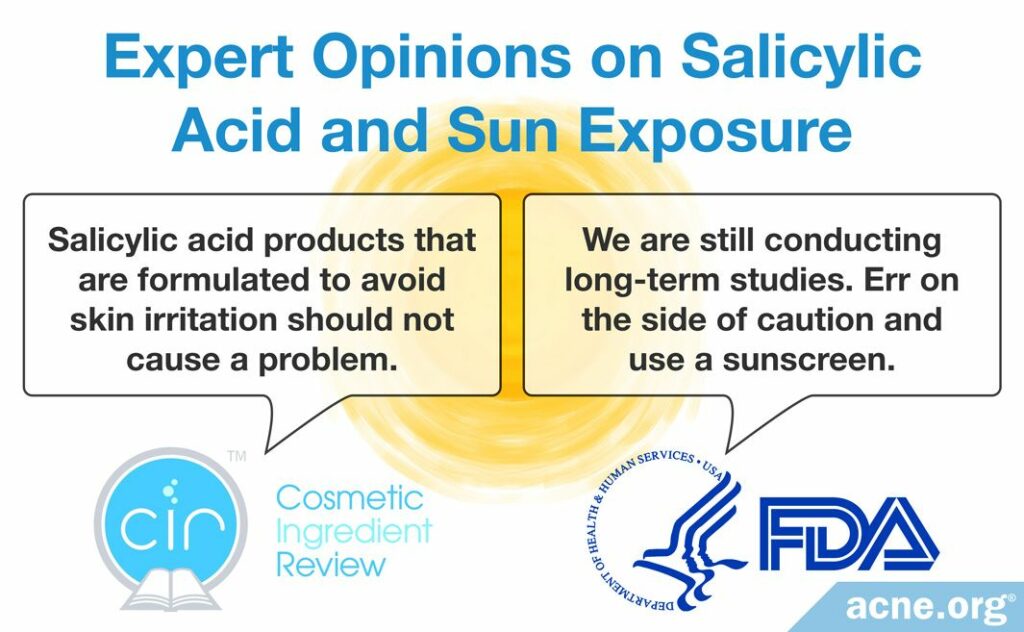
The Cosmetic Ingredient Review (CIR), a research organization in the U.S. that tests cosmetic ingredients and publishes safety guidelines, believes that products containing salicylic acid are safe if they are formulated with care to avoid skin irritation.3
The FDA still recommends sunscreen while using skin care products or makeup with salicylic acid.8
As we have seen, research evidence indicates that salicylic acid does not make the skin more sensitive to the sun and, in fact, scientists think that salicylic acid may even protect the skin from sunburn.
The Food and Drug Administration (FDA), a U.S. government organization that regulates medications, is currently conducting long-term studies sponsored by the National Toxicology Program to examine the safety of salicylic acid. Until these studies are completed, the FDA recommends that people err on the side of caution and apply sunscreen while using topical products with salicylic acid.8
Why Even Worry about Salicylic Acid and Sun Exposure?
As we all know, excessive sun exposure can in itself be harmful to the skin. It can cause premature skin aging and, in some cases, can result in serious consequences, such as skin cancer.
Concerns about salicylic acid and sun exposure are based on the fact that alpha hydroxy acids, which are closely related to salicylic acid, do make the skin more sensitive to the sun. A compelling amount of evidence shows that AHAs can increase sun damage in skin cells.
For instance, research indicates that using AHAs for four weeks can increase skin redness caused by the sun by 18% and can double the sun damage to skin cells. In other words, your skin may be more sensitive to the sun and may burn more easily while you use AHAs.3
Because of this, the FDA recommends that manufacturers label products containing AHAs with this statement:
- “Sunburn Alert: This product contains alpha hydroxy acid (AHA) which can increase your skin’s sensitivity to the sun and especially the possibility of sunburn. Use a sunscreen, wear protective clothing, and limit sun exposure while using this product and for a week afterwards.”3
However, salicylic acid is probably much less sensitizing than AHAs. So, while there is good reason to take precautions in the sun while using AHAs, you can likely rest easy when it comes to salicylic acid.
Still, it is better to stay on the safe side and wear sunscreen when using topical products with salicylic acid while we wait for more research evidence to come in. This will definitely do the trick, as confirmed by one recent study performed in Italy during the summer months. In that study, patients who used an anti-acne gel containing 0.5% salicylic acid also applied sunscreen to their skin. After two months of using the gel and sunscreen daily, the patients’ skin showed no evidence of sun damage.9
How Does Salicylic Acid Help with Acne?
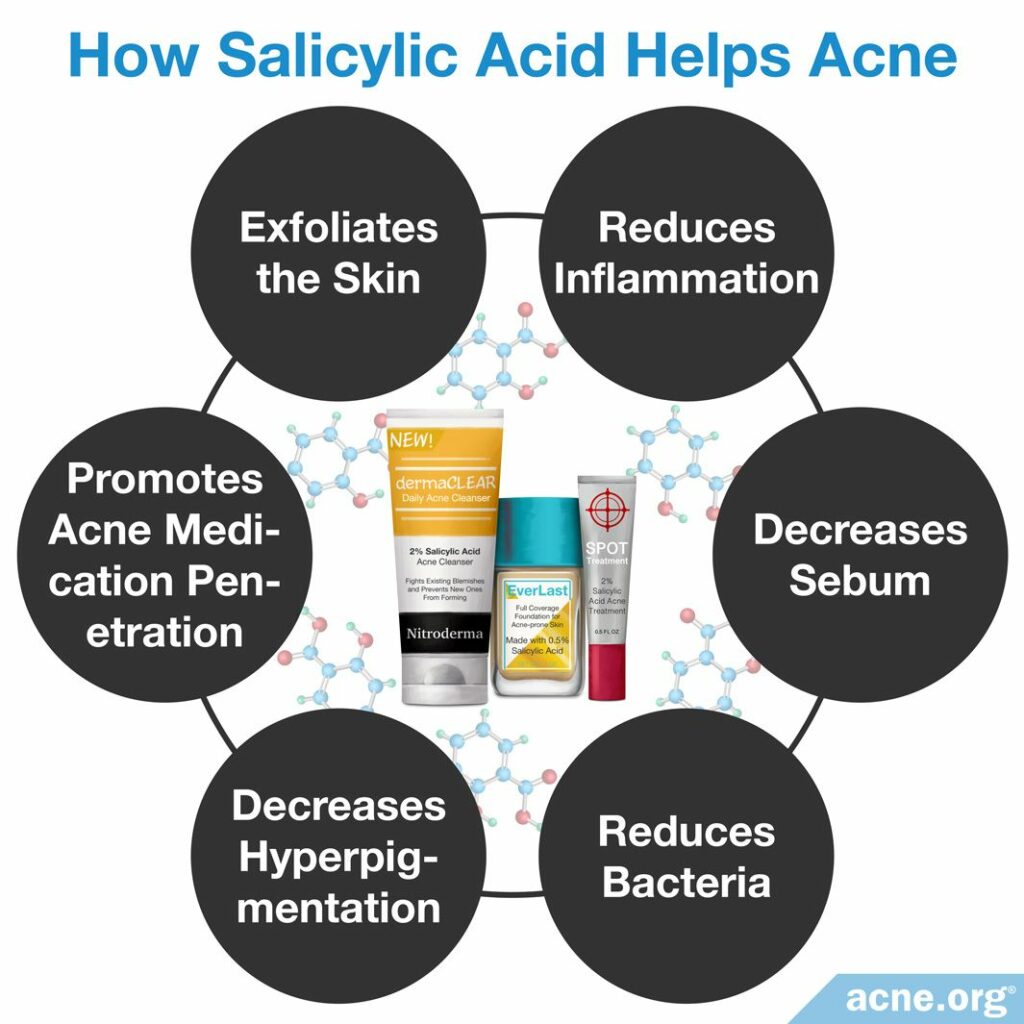
Salicylic acid, while only moderately improving acne, remains a popular anti-acne ingredient in over-the-counter skin treatments and makeup because it fights acne with multiple “weapons.” Salicylic acid:
- Exfoliates: By removing skin cells called corneocytes from the skin surface and from inside pores, salicylic acid unclogs pores and breaks up clogged pores (whiteheads and blackheads), helping the skin to heal after a breakout.
- Reduces sebum: Salicylic acid reduces the amount of skin oil, called sebum, inside pores, helping to prevent the flourishing of acne bacteria that feeds on sebum.
- Is anti-inflammatory: Salicylic acid reduces inflammation (redness, swelling, soreness, and itching), which is part and parcel of acne.
- Helps kill pain: Salicylic acid is a mild anesthetic (painkiller) and may help to reduce discomfort caused by acne breakouts.
- Demonstrates antimicrobial activity: Salicylic acid can kill some bacteria and might possibly be able to prevent the growth of acne bacteria (C. acnes) in skin pores.
- Improves absorption of medications into the skin: Salicylic acid helps other ingredients in topical treatments to penetrate the skin, making them more effective.1,2
However, scientists do not know exactly how salicylic acid accomplishes all of this. That is to say, the exact mechanism by which salicylic acid fights acne is still unknown.
Salicylic acid works best on oily skin
Salicylic acid is fat-soluble (mixes easily with fats and oils). When a person applies salicylic acid onto the skin, the salicylic acid mixes with the sebum, making the salicylic acid more likely to penetrate into the skin and produce a medicinal effect. This is why salicylic acid works particularly well in people with oily skin.2 Conveniently, acne-prone skin tends to be oily, which means salicylic acid would tend to work well in the people who need it most.
Over-the-counter Products Only Contain Small Amounts of Salicylic Acid
In the United States, over-the-counter acne treatments may contain no more than 2% salicylic acid. Skin care products and makeup for acne-prone skin typically contain between 0.5% and 2% salicylic acid. As we have seen, such low concentrations are unlikely to make the skin more sensitive to the sun.
However, regulations do permit a higher concentration of salicylic acid in chemical peels. This is because, unlike over-the-counter treatments, which anybody can purchase and apply at home, a salicylic acid chemical peel is only performed by an esthetician/cosmetician, nurse, or doctor. In addition, a chemical peel is only applied for a brief period of time and then washed off. For these reasons, a chemical peel can contain up to 30% salicylic acid.2 Such a high concentration of salicylic acid might indeed make the skin more sensitive to sun damage, so make sure to follow your provider’s instructions for using sun protection after a chemical peel.
Side Effects of Salicylic Acid
Common side effects of over-the-counter levels of salicylic acid include mild skin irritation, redness, and a feeling of dryness.
Hydroxy acids in general can also cause swelling, itching, and skin discoloration, but these side effects usually occur at concentrations higher than 2%. Generally, the side effects of salicylic acid are milder than the side effects of AHAs and most often occur with higher concentrations.
It is important to note that, because of its chemical similarity to aspirin, salicylic acid can cause serious side effects in pregnancy, such as miscarriage, bleeding, and various birth defects.2,3
The Bottom Line
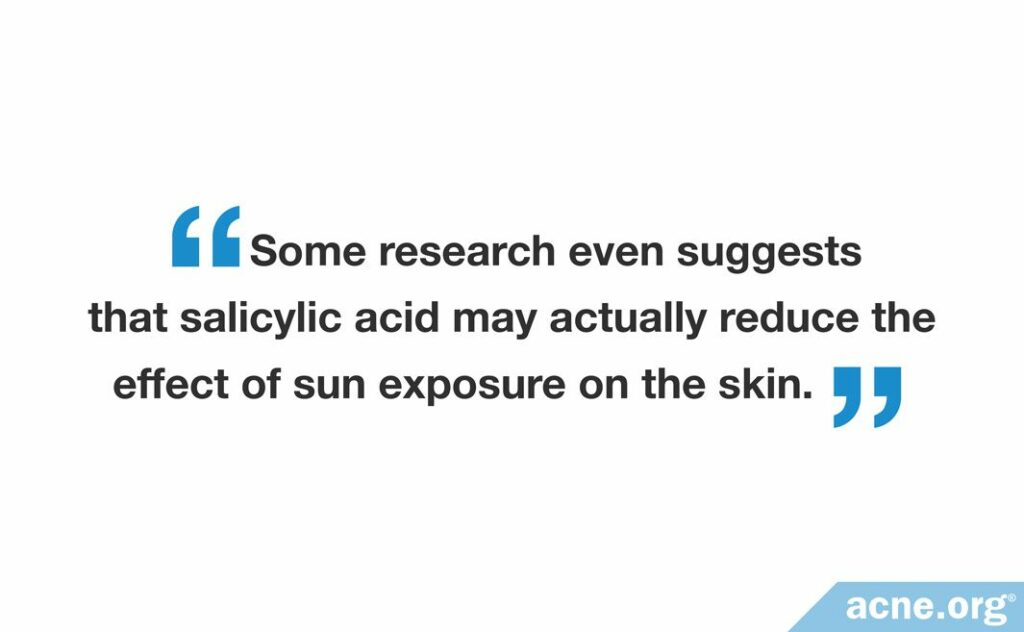
When it comes to salicylic acid, based on the evidence so far, increased sun damage while using salicylic acid is probably not a concern. Research suggests that salicylic acid at the concentrations found in over-the-counter products does not make the skin more sensitive to the sun. However, while we wait for more research to confirm this, to be on the safe side, wear sunscreen while you use salicylic acid.
References
- Kornhauser, A., Coelho, S. G. & Hearing, V. J. Applications of hydroxy acids: classification, mechanisms, and photoactivity. Clin Cosmet Investig Dermatol 3, 135 – 142 (2010). https://www.ncbi.nlm.nih.gov/pmc/articles/PMC3047947/
- Arif, T. Salicylic acid as a peeling agent: a comprehensive review. Clin Cosmet Investig Dermatol 26, 455 – 61 (2015). https://www.ncbi.nlm.nih.gov/pubmed/26347269
- Alpha Hydroxy Acids https://www.fda.gov/cosmetics/productsingredients/ingredients/ucm107940.htm
- Kornhauser, A. et al. The effects of topically applied glycolic acid and salicylic acid on ultraviolet radiation-induced erythema, DNA damage and sunburn cell formation in human skin. J Dermatol Sci 55, 10 – 7 (2009). https://www.ncbi.nlm.nih.gov/pubmed/19411163
- Bair, W. B. et al. Inhibitory effects of sodium salicylate and acetylsalicylic acid on UVB-induced mouse skin carcinogenesis. Cancer Epidemiol Biomarkers Prev 11, 1645 – 1652 (2002). https://www.ncbi.nlm.nih.gov/pubmed/12496056
- Madan, R. K. & Levitt, J. A review of toxicity from topical salicylic acid preparations. J Am Acad Dermatol 70, 788-792 (2014). https://pubmed.ncbi.nlm.nih.gov/24472429/
- Bubna, A. K. Aspirin in dermatology: Revisited. Indian Dermatol Online J. 6, 428-435 (2015). https://pubmed.ncbi.nlm.nih.gov/26753146/
- Beta Hydroxy Acids https://www.fda.gov/cosmetics/productsingredients/ingredients/ucm107943.htm
- Ricci, F., Masini, F., Fossati, B., Frascione, P., De Waure, C., Capizzi R, Guerriero C. Combination therapy with hydrogen peroxide (4%), salicylic acid (0.5%) and D-panthenol (4%): efficacy and skyn tolerability in common acne vulgaris during sun exposure period. Eur Rev Med Pharmacol Sci 20, 232-236 (2016). https://pubmed.ncbi.nlm.nih.gov/26875890/
The post Does Salicylic Acid Make Your Skin More Sensitive to the Sun? appeared first on Acne.org.

